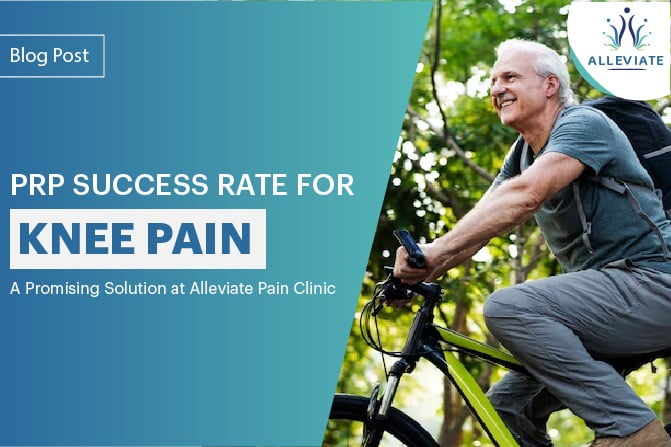Introduction
Knee pain is a widespread issue that affects people of all ages and backgrounds. Whether it’s caused by osteoarthritis, injury, or other factors, living with knee pain can be debilitating. Fortunately, there are various treatment options available to help patients find relief, and one of the most promising among them is Platelet-Rich Plasma (PRP) therapy.
At Alleviate Pain Clinic, we are a dedicated team of healthcare professionals who have been diligently working to provide effective solutions for knee pain. Our commitment to patient care and the use of PRP has yielded remarkable results, with an overall success rate of 75% at the 12-month follow-up on a substantial cohort of 6,000 patients. In this article, we’ll delve into the details of our success, focusing on the utilization of PRP and Prolotherapy for Grade 1 to Grade 3 knee pain. Patients with Grade 4 Arthritis including features like bone on bone arthritis, varus and fixed flexion deformities and pain even on mild weight bearing were advised other treatment modalities.
Understanding PRP Therapy


Platelet-Rich Plasma (PRP) therapy is a cutting-edge regenerative treatment that harnesses the healing power of a patient’s own blood. PRP is rich in platelets, which contain growth factors and proteins that aid in tissue repair and regeneration. When injected into the knee joint, PRP can stimulate the natural healing process, reduce inflammation, and alleviate pain.
Tailoring Treatment Based on Severity
At Alleviate Pain Clinic, patients with knee pain are carefully evaluated to determine the most appropriate treatment. The severity of knee pain is categorized into three grades:
- Grade 1: Mild pain and discomfort.
- Grade 2: Moderate pain with limitations in mobility.
- Grade 3: Considerable pain, significant limitations in mobility, and possible structural damage.
- Grade 4: Severe pain, bone on bone arthritis, altered biomechanics +/- Deformity
Treatment Prolotocol


Most patients underwent 3 sessions of Image Guided Platelet Rich Plasma Injection with Prolotherapy for the soft tissue attachments. Upto 5ml of Prp yield on an average was obtained with a concentration of 6-8 times over the baseline.( as confirmed by periodic testing of Prp samples in Reputed labs)
Success Rates Based on Grades
Grade 1 Patients (Mainly Grade 2)
For patients with Grade 1 and primarily Grade 2 knee pain, PRP therapy has shown remarkable success. Up to 80% of these patients experienced significant improvement in pain and function after undergoing PRP treatment.
Grade 3 Patients
Patients with Grade 3 knee pain, which is typically more severe and often associated with structural issues, also benefited from PRP therapy. Approximately 70% of Grade 3 patients reported notable improvements in their knee pain and function.
Assessing Improvement: WOMAC and VAS Scoring
To measure the effectiveness of PRP therapy, Alleviate Pain Clinic uses two widely recognized assessment tools:
WOMAC (Western Ontario and McMaster Universities Osteoarthritis Index)
WOMAC is a comprehensive questionnaire designed to assess pain, stiffness, and physical function in individuals with knee osteoarthritis. Patients are asked to rate their symptoms on a scale, and the scores are tracked before and after treatment. The improvement in WOMAC scores has been substantial for many patients following PRP therapy.
VAS (Visual Analog Scale)
The Visual Analog Scale is a simple yet effective tool to gauge the intensity of pain. Patients mark their pain level on a 0-10 scale, with 0 being no pain and 10 being the worst pain imaginable. PRP therapy has consistently resulted in reduced VAS scores, indicating decreased pain and improved quality of life.
Conclusion
The success rate of PRP therapy for knee pain at Alleviate Pain Clinic is a testament to the potential of regenerative medicine in pain management. With a 75% overall success rate and significant improvements seen in Grade 1, Grade 2, and Grade 3 patients, PRP therapy is proving to be a valuable non-surgical option for knee pain relief.
If you’re living with knee pain, it’s essential to consult with a qualified healthcare professional to determine the most suitable treatment plan for your specific condition. PRP therapy, combined with Prolotherapy for Grade 1 and primarily Grade 2 patients, offers promising results and the potential to regain mobility and enjoy a better quality of life.
The thousands of knee pain patients who have experienced the benefit of Regenerative Treatment at Alleviate Pain Clinic are testament to the patient-centred care and dedication to utilizing innovative treatments like PRP and Prolotherapy as part of a multidisciplinary approach.
Please note that the success of PRP therapy can vary from person to person, and individual results may differ. It’s crucial to consult with a healthcare provider to determine the most appropriate treatment plan for your unique circumstances.



